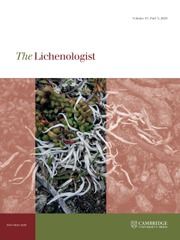Article contents
Practice and Prejudice in Lichen Classification
Published online by Cambridge University Press: 14 January 2009
Abstract
Organismal species exist as historical entities, and essentialistic thinking about ‘ defining ’ species and higher taxa should be avoided. Lichens are biological phenomena that are best understood as processes, and they behave very differently from the model organisms of most systematic theories. Classification and phylogenetic reconstructions are seen as different endeavours, having different aims and languages. A hierarchical classification is supported, and recognition of superspecific taxa is seen as a matter of convenience. Superspecific taxa may be recognized as groups having correlated features, whereas the common recognition of such taxa by a priori cardinal characters should be abandoned. Superspecific taxa having correlated features are distinctive and are likely to be monophyletic. Distinctive and phylogenetically coherent grades may need naming to avoid nomenclatural instability. In classifications, the hypothesized monophyletic status of taxa may be indicated by some convention. Phylogenetic reconstruction by cladistic parsimony analyses includes assumptions that need scrutinizing and modifying to improve the methodology. Analyses should be examined with respect to robustness for changes in the frequently applied equal weighting assumption. For some types of data an a priori weight assignment might be possible, or equal weighting may be justified.
- Type
- Research Article
- Information
- Copyright
- Copyright © British Lichen Society 1998
- 4
- Cited by




